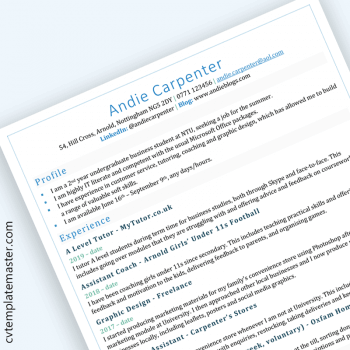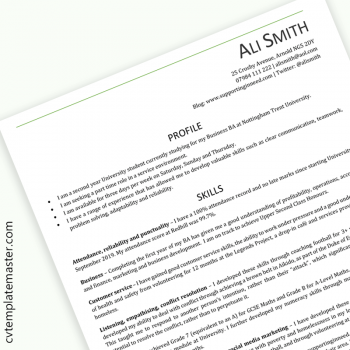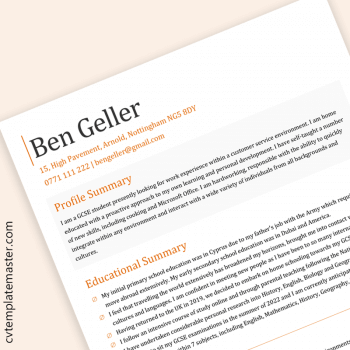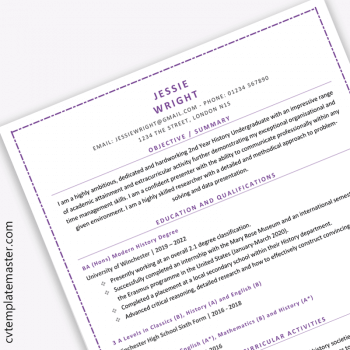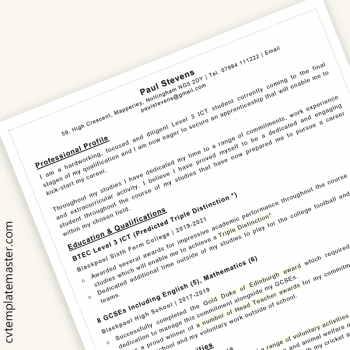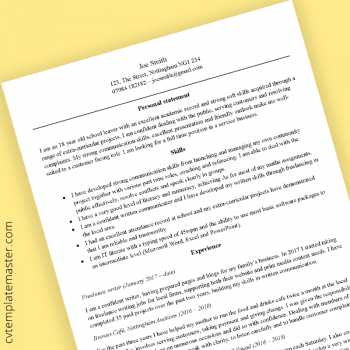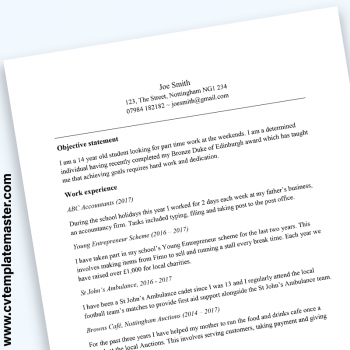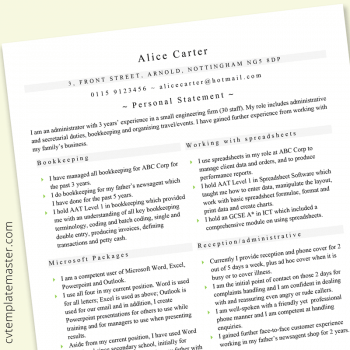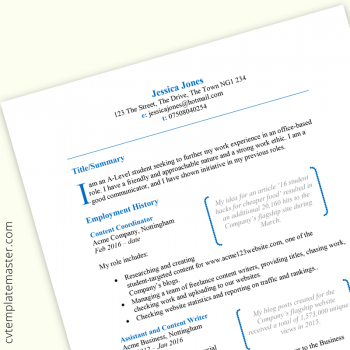Here’s a full preview of page one of this CV for a summer job:
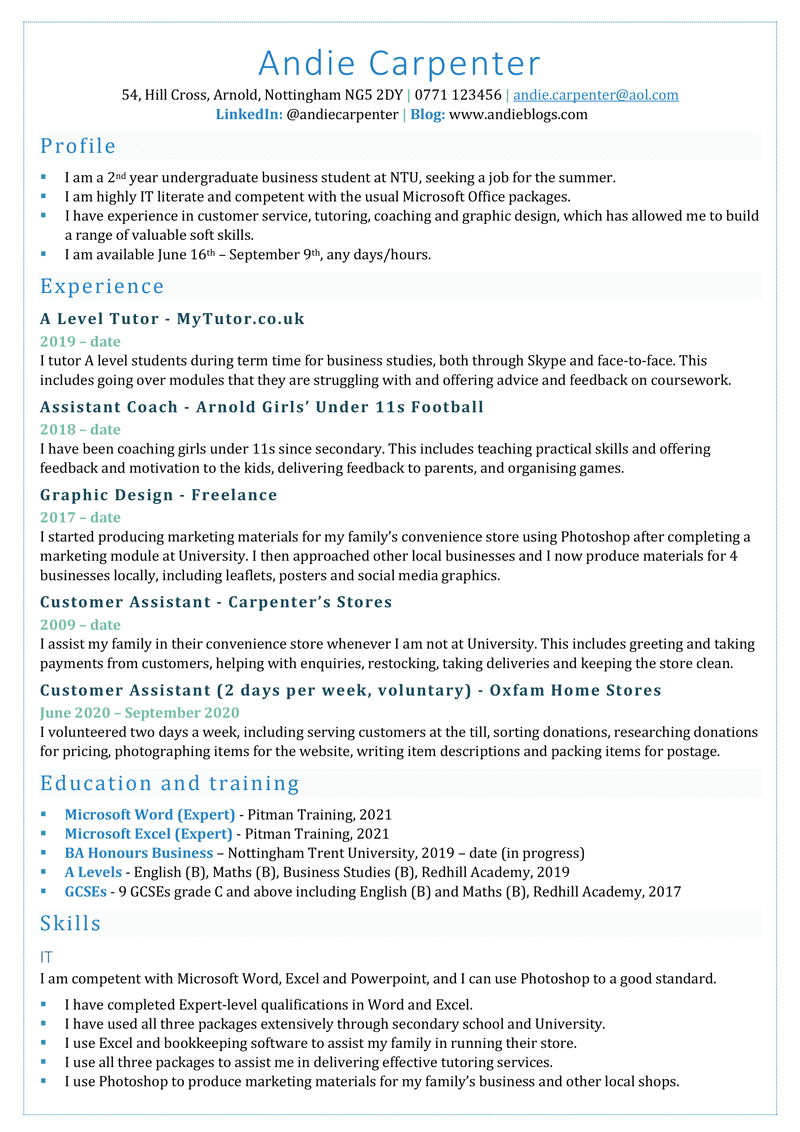
Here’s page two:
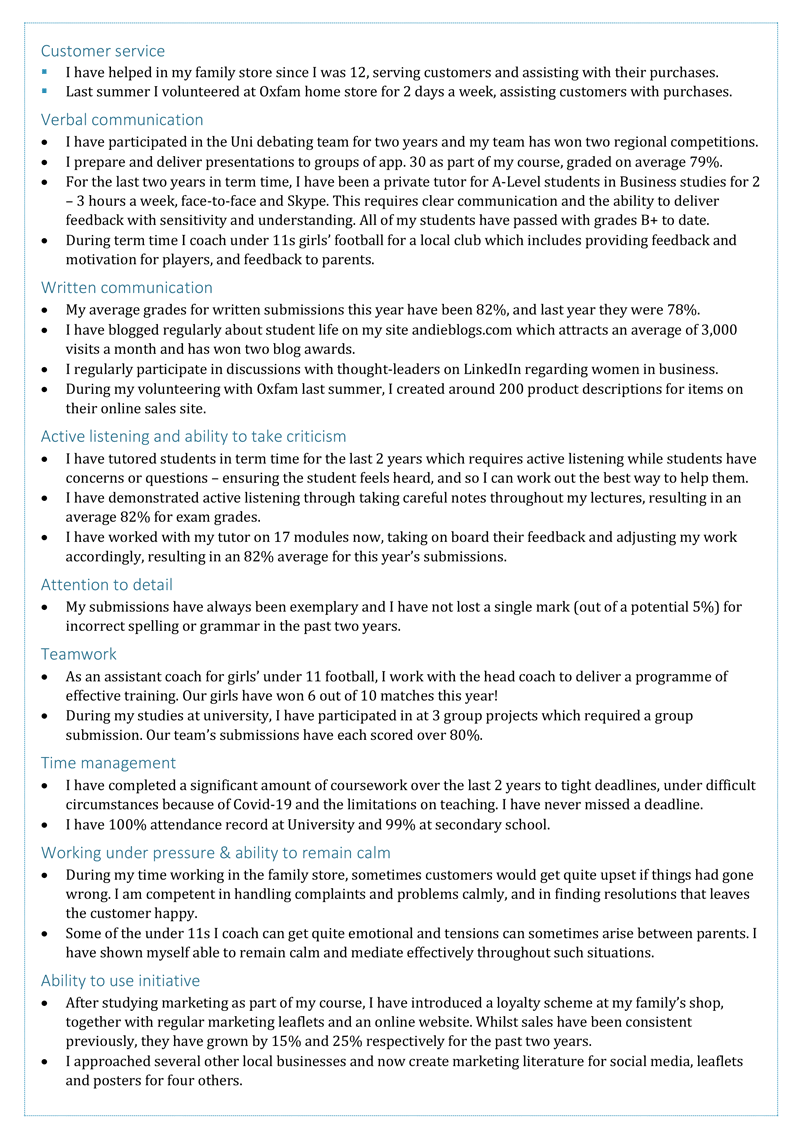
How to write a CV for a summer job
Can you believe that summer is just 38 days away? This year seems to be simply flying by, and with the prospect of restaurants and bars opening fully in just a few day’s time, it won’t be long before employers start recruiting again.
If you’re looking for a student summer job CV, we have a great CV template and guide for you. Just click ‘Price: Free Download‘ above to get your template and read on.
The first thing to note if you’re reading through the template is, don’t panic! We have included lots of examples of work-type experience, but we wouldn’t expect the majority of students to have quite as much to add to their CV. In fact, if you’ve got absolutely no experience like this at all, we’ve got you covered. We’ve designed this template with a focus on skills rather than experience and in this guide, we’ll give you lots of ideas for how you can demonstrate those skills through study and completing informal tasks.
NB: If you’re under 18, click here to find out how many hours you can work.
Personal details
Your CV needs to include:
- Your first and last name at the top
- Your email address and phone number underneath
DON’T add any other personal information (e.g. religion, disabilities), unless they are in some way highly relevant to the job opening.
DO add your LinkedIn profile if you have set it up professionally and you’re currently using it to network / share relevant professional posts. It can be a useful way of expanding out sections of your CV. Click here to read a guide on setting it up.
If you have a blog, add the URL only if the content is professionally appropriate. It doesn’t have to be about industry-relevant topics but consider whether an employer would want to associate their company with what you have written. If it passes this test, include it – because blogging can help demonstrate that you have lots of skills such as adaptability, time management, organisation, creativity, social media and of course, strong written communication.
Profile
After your personal details, you need to write a short profile introducing yourself and explaining why you’re suitable for the role. It’s really important to carefully read the job description and address the main requirements here. For example:

In response to this advert, you could write something like this:”
“Through working in a busy local café on Saturdays, I have developed my team working skills and have proven my ability to work under pressure whilst continuing to deliver delicious high-quality food and an excellent customer experience.”
Many students will go for fairly simple job roles such as bartending, waiter/essing or retail over the summer. The job advert may therefore be fairly short on requirements. Take this actual bartending job advert for example:
“Must have bubbly personality and speak English. Start immediately.”
For adverts like this, you need to really consider what soft skills the employer is actually looking for. In this context we would assume a ‘bubbly personality’ really means:
- Friendly, outgoing, positive
- Great customer service skills
- Excellent verbal communication skills
- Active listening skills
- The ability to sell products and services
- The ability to work with others (and enjoy it!)
Looking at job profiles on the National Careers Service website can help build a better picture of what an employer is likely to be looking for.
It’s not enough simply to list off these skills and character traits – you need to offer as much evidence as possible. So, for example, if you’re claiming active listening skills, think about when you’ve used this skill and what results you’ve achieved with it. The CV template has some examples to help you.
Qualifications
On a standard CV, we’d expect the work history to come before the qualifications, but for a student CV it’s more common to see the qualifications section first.
On a standard CV, you’d also usually list your highest qualification first. However, you might want to include recent, relevant vocational qualifications at the top, such as Word or Excel certificates.
When you list your GCSEs and A levels, place emphasis on any that are relevant to the role, together with English and Maths if you have them. These are valued by virtually every employer.
For most jobs, employers really value IT skills – and bolstering them with an online course may be just the way to stand out from the competition. There are plenty of online courses in Microsoft Word, Excel and Powerpoint. Try to find accredited courses with respectable awarding bodies who will give you a certificate at the end.
Work history
If you have any sort of work experience at all, you can list it in your work history with the most recent experience first. This doesn’t have to be paid experience – it might be volunteering, or a work experience placement.
You can incorporate evidence of the skills you’ve built in your work history. However, on the CV template, we have taken the approach of keeping the work history very brief, and placing an emphasis on the skills section instead. The right approach really depends on your background. If you want to show how you’ve built and used skills in a variety of ways (e.g. through education, volunteering, freelancing etc.), the approach in our sample CV works very well.
Skills
The skills section makes up the bulk of this example CV and we’ve included a range of common skills that apply to almost every job. So how can you show that you’ve acquired and used a skill? Here are some ideas:
Voluntary work
This might be:
- A placement within a shop or soup kitchen, or at an animal rescue centre
- Helping a religious organisation with charity work such as preparing meals
- Organising something for a charity, such as collecting donations
- Helping out a local business or school
- Litter picking or helping at a country park
- Volunteering at a residential / nursing home
- Voluntary projects through girl guiding or scouts
- Helping at events through an organisation such as St John’s Ambulance
- Helping out at local events (such as marathons) in other ways such as marshalling
- Helping the sensei / teacher at a dojo or dance studio
- Assisting a sports coach with teaching a younger / less experienced group
- Helping at PGL
- Writing/blogging for a local business, organisation or publication
If you want to volunteer to boost your CV, join local community groups on Facebook – you’ll quickly hear about local projects that are happening in your area. You can also find voluntary placements on:
Community work
Community work is an excellent way to develop and demonstrate your soft skills. This might be helping with a specific project such as a social farm or garden, or generally helping out in your local neighbourhood. There is an comprehensive list of ideas here and here.
Taking part in community projects can help demonstrate that you’ve taken the initiative. It might also show teamwork, communication, organisation, leadership and many other valuable skills, depending on the nature of the project.
Work experience placements
These may have been organised by your school or educational institution. Even if they didn’t provide a lot of industry-relevant practical experience, they can help demonstrate a very wide range of valuable skills, such as timekeeping, communication, teamwork, working to deadlines, determination, perseverance and resolve, and learning from your mistakes.
Temporary jobs
If you’ve helped out a local business or even a family member for a few days here and there, it’s still ok to include this experience on your CV. Example:
“I went along and helped my grandma and her friend out at a once-a-month community fayre. We rotated the tasks which included taking orders, preparing food, serving food, taking payment and giving change – I needed a good memory, the ability to calculate change quickly and accurately, the ability to work together, and an appreciation for health and safety standards. It got very busy but I remained calm, friendly and polite at all times.”
Own projects and achievements
Have you started your own successful blog? Have you trained in martial arts and achieved a high-level belt? Have you built up your Instagram followers in relation to a particular topic? Have you programmed a piece of software or written some code that does something useful? Have you built a robot at home or invented something useful?
Personal achievements can show many different skills and valued attributes. They can demonstrate that you are committed, focused, disciplined and determined to succeed, and can put in the time and hard work to achieve a goal. You can include these in your skills section, or in a separate hobbies section.
Freelancing
Freelancing is a great way to show that your skills are developed to the stage where other people will pay you for them!
You might be successful with freelancing using specific hard skills such as programming, graphic design or blogging/writing. Alternatively it may be for practical skills that you’ve built up, such as painting and decorating or gardening.
If you’ve not yet delved into the world of freelancing online, check out this list of sites where you can list your services (we recommend PeoplePerHour.com and Fiverr).
Helping with the family business
If you’ve helped with the family business, this provides great work experience for your CV – whether or not you got paid. This might be helping in a shop, creating marketing materials, doing the books or any other tasks that have assisted your family.
If your efforts have resulted in any particular achievements, be sure to mention them.
Helping a family member
Regularly helping a family member – for example, helping an elderly relative regularly with their cleaning, shopping and other general tasks – may demonstrate a whole range of valuable skills. Caring typically requires reliability, flexibility, adaptability, active listening skills, organisation and planning, patience, empathy, reliability, compassion, a sense of responsibility and a positive disposition, come what may! You may also have exercised hard skills such as looking after a relative’s bills and paperwork.
Awards schemes
Completion of award schemes such as Duke of Edinburgh and Crest awards can help demonstrate skills, as can completing certificates such as the Army Cadets proficiency certificate. Don’t assume the person reading your CV will know what these schemes are – spell out what you achieved and what skills you’ve built in the process.
Casual work
Casual work such as regular babysitting, dog walking, gardening, car washing, selling products (make up, perfume, housewares*) can all show a range of skills and attributes. They demonstrate taking responsibility and using your initiative, amongst other things. They can also show business skills – the ability to build up a customer base, earn money and retain loyal customers! You can make casual work sound even more impressive if you explain how you fitted these around your other commitments and/or generated a good wage from them.
* Take care when getting involved with casual selling schemes such as those that claim you can make money selling make up and perfume. Often you are required to buy an initial kit and keep purchasing a certain level of products each month. Very often these end up costing you more than you ever make from sales. Read this article for more info.
Tutoring
If you’ve tutored or mentored students, either on your own course or for lower qualifications, this is a good way to show a range of skills such as active listening, communication, organisation and empathy.
Tutoring is a great way to bolster your CV and keep your knowledge fresh. You can tutor remotely through sites such as MyTutor.co.uk.
Paid employment
Last but not least, paid employment, no matter what the position, can show a range of skills – and many of these are transferable to other positions. Be sure to highlight how any employment you’ve completed is relevant. For example, the skills you build through bar work (teamwork, communication, working under pressure, customer service) can be highly relevant to a retail position, even though both roles are different.
What if I’ve not done any of the above?
If none of the above examples apply to you, don’t worry! Even if you can’t check off a single item from the above list, your education still provides a whole range of ways to show that you have valuable skills.
Think about what you’ve done during your time at school or university:
- Have you worked on a project in a team? (teamwork, communication, collaboration, creativity)
- Have you led a group? (teamwork, communication, leadership, motivation, mentoring)
- Have you completed written assignments and received good grades? (written communication, creativity)
- Have you got a good attendance record? (punctuality, reliability)
- Have you created and delivered a presentation? (oral communication, creativity)
- Have you taken notes that helped you achieve good exam grades? (active listening, organisation)
- Did you come up with original ideas for projects or assignments? (creativity, taking initiative)
- Have you encountered problems either at school or outside of it that you solved? (problem solving)
Try to mention results such as grades where possible.
Bolster your skills
Don’t forget that it’s very easy to bolster your CV with online courses. If you’re 19+ and not already in Government funded training, Vision2Learn offers a range of free Level 2 courses which you can take in lots of valuable subjects including:
- Microsoft Word and Excel
- Customer Service
- Business and Administration
- Equality and Diversity
FutureLearn.com also has a range of free and paid online courses, and the Open University offers a range of courses that come with a free digital badge, downloadable from your OpenLearn Profile and can be sharable on social media/LinkedIn/other online platforms.
Free student CV template downloads
Here are some other helpful templates and examples for students writing a CV:
